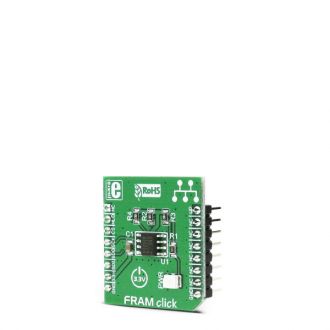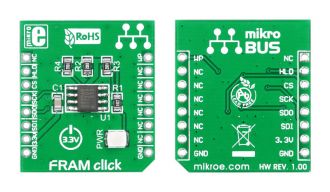
We strongly encourage users to use Package manager for sharing their code on Libstock website, because it boosts your efficiency and leaves the end user with no room for error. [more info]

Rating:
Author: MIKROE
Last Updated: 2018-03-13
Package Version: 1.0.0.1
mikroSDK Library: 1.0.0.0
Category: FRAM
Downloaded: 9304 times
Followed by: 2 users
License: MIT license
Simple demonstration of using MB85RS256A FRAM chip. Example demonstrates writing and reading from FRAM chip
Do you want to subscribe in order to receive notifications regarding "FRAM click" changes.
Do you want to unsubscribe in order to stop receiving notifications regarding "FRAM click" changes.
Do you want to report abuse regarding "FRAM click".


Library Description
Key functions:
Examples Description
The application is composed of three sections:
void applicationTask()
{
mikrobus_logWrite("Writing MikroE to Fram memory, from address 0x0150:",
_LOG_LINE);
fram_write (0x0150, &wrData[0], 9);
mikrobus_logWrite("Reading 9 bytes of Fram memory, from address 0x0150:",
_LOG_LINE);
fram_read(0x0150,&rdData[0],9);
mikrobus_logWrite("Data read: ",_LOG_TEXT);
mikrobus_logWrite(rdData,_LOG_LINE);
Delay_ms(1000);
}
Other mikroE Libraries used in the example:
Additional notes and information
Depending on the development board you are using, you may need USB UART click, USB UART 2 click or RS232 click to connect to your PC, for development systems with no UART to USB interface available on the board. The terminal available in all MikroElektronika compilers, or any other terminal application of your choice, can be used to read the message.